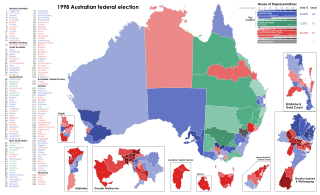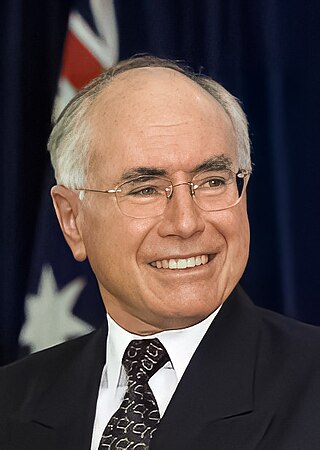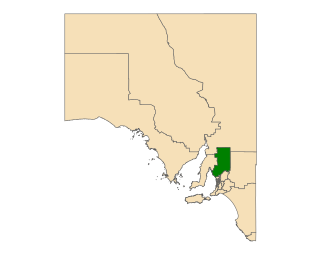Related Research Articles
A by-election, also known as a special election in the United States and the Philippines, and a bye-election or a bypoll in India, is an election used to fill an office that has become vacant between general elections.

The 1998 Australian federal election was held to determine the members of the 39th Parliament of Australia. It was held on 3 October 1998. All 148 seats of the House of Representatives and 40 seats of the 76 seat Senate were up for election. The incumbent centre-right Liberal/National Coalition government led by Prime Minister John Howard of the Liberal Party and coalition partner Tim Fischer of the National Party defeated the centre-left Australian Labor Party opposition led by Opposition Leader Kim Beazley, despite losing the nationwide popular and two-party preferred vote. However, the Australian Labor Party gained seats compared to the previous election.

The 2004 Australian federal election was held in Australia on 9 October 2004. All 150 seats in the House of Representatives and 40 seats in the 76-member Senate were up for election. The incumbent Liberal Party of Australia led by Prime Minister of Australia John Howard and coalition partner the National Party of Australia led by John Anderson defeated the opposition Australian Labor Party led by Mark Latham.

The Family First Party was a conservative political party in Australia which existed from 2002 to 2017. It was founded in South Australia where it enjoyed its greatest electoral support. Since the demise of the Australian Conservatives into which it merged, it has been refounded in that state as the Family First Party (2021), where it contested the state election in 2022, but failed to win a seat.

The Liberal–National Coalition, commonly known simply as the Coalition or the LNP, is an alliance of centre-right to right-wing political parties that forms one of the two major groupings in Australian federal politics. The two partners in the Coalition are the Liberal Party of Australia and the National Party of Australia. Its main opponent is the Australian Labor Party (ALP); the two forces are often regarded as operating in a two-party system. The Coalition was last in government from 2013 to 2022. The group is led by Peter Dutton, who succeeded Scott Morrison after the 2022 federal election.
A safe seat is an electoral district which is regarded as fully secure, for either a certain political party, or the incumbent representative personally or a combination of both. With such seats, there is very little chance of a seat changing hands because of the political leanings of the electorate in the constituency concerned or the popularity of the incumbent member. This contrasts with a marginal seat in which a defeat for the seat holder is considered possible. In systems where candidates must first win the party's primary election, the phrase "tantamount to election" is often used to describe winning the dominant party's nomination for a safe seat.
The Division of Mayo is an Australian electoral division located to the east and south of Adelaide, South Australia. Created in the state redistribution of 3 September 1984, the division is named after Helen Mayo, a social activist and the first woman elected to an Australian University Council. The 9,315 km2 rural seat covers an area from the Barossa Valley in the north to Cape Jervis in the south. Taking in the Adelaide Hills, Fleurieu Peninsula and Kangaroo Island regions, its largest population centre is Mount Barker. Its other population centres are Aldgate, Bridgewater, Littlehampton, McLaren Vale, Nairne, Stirling, Strathalbyn and Victor Harbor, and its smaller localities include American River, Ashbourne, Balhannah, Brukunga, Carrickalinga, Charleston, Cherry Gardens, Clarendon, Crafers, Cudlee Creek, Currency Creek, Delamere, Echunga, Forreston, Goolwa, Gumeracha, Hahndorf, Houghton, Inglewood, Kersbrook, Kingscote, Langhorne Creek, Lobethal, Macclesfield, McLaren Flat, Meadows, Middleton, Milang, Mount Compass, Mount Pleasant, Mount Torrens, Mylor, Myponga, Normanville, Norton Summit, Oakbank, Penneshaw, Piccadilly, Port Elliot, Second Valley, Springton, Summertown, Uraidla, Willunga, Woodchester, Woodside, Yankalilla, and parts of Birdwood, Old Noarlunga and Upper Sturt.
The Division of Sturt is an Australian electoral division in South Australia. It was proclaimed at the South Australian redistribution of 11 May 1949. Sturt was named for Captain Charles Sturt, a nineteenth century British Military officer and explorer.

Frome is a single-member electoral district for the South Australian House of Assembly. It is named after Edward Charles Frome, the third surveyor-general of South Australia. The electorate stretches north-eastwards from the Gawler River and Gulf St Vincent in the south, and includes many of the agricultural areas of the Clare and Gilbert Valleys. It covers a total of 12,921 km2 (4,989 sq mi) and takes in the towns of Auburn, Clare, Mintaro, Port Broughton, Saddleworth, Snowtown and Riverton. Prior to the 2020 redistribution, its main population centre was Port Pirie, since transferred to Stuart.
The term swing refers to the extent of change in voter support, typically from one election or opinion poll to another, expressed as a positive or negative percentage point. For the Australian House of Representatives and the lower or unicameral houses of the parliaments of all the states and territories except Tasmania and the ACT, as well as Tasmania's upper house, Australia employs preferential voting in single-member constituencies. Under the full-preference instant-runoff voting system, in each seat the candidate with the lowest vote is eliminated and their preferences are distributed, which is repeated until only two candidates remain. While every seat has a two-candidate preferred (TCP) result, seats where the major parties have come first and second are commonly referred to as having a two-party-preferred (TPP) result. The concept of "swing" in Australian elections is not simply a function of the difference between the votes of the two leading candidates, as it is in Britain. To know the majority of any seat, and therefore the swing necessary for it to change hands, it is necessary to know the preferences of all the voters, regardless of their first preference votes. It is not uncommon in Australia for candidates who have comfortable leads on the first count to fail to win the seat, because "preference flows" go against them.

In Australian politics, the two-party-preferred vote is the result of an election or opinion poll after preferences have been distributed to the highest two candidates, who in some cases can be independents. For the purposes of TPP, the Liberal/National Coalition is usually considered a single party, with Labor being the other major party. Typically the TPP is expressed as the percentages of votes attracted by each of the two major parties, e.g. "Coalition 50%, Labor 50%", where the values include both primary votes and preferences. The TPP is an indicator of how much swing has been attained/is required to change the result, taking into consideration preferences, which may have a significant effect on the result.

Elections were held in the state of Western Australia on 10 February 2001 to elect all 57 members to the Legislative Assembly and all 34 members to the Legislative Council. The two-term Liberal–National coalition government, led by Premier Richard Court, was defeated by the Labor Party, led by Opposition Leader Dr Geoff Gallop, in a landslide.

The 1974 Australian federal election was held in Australia on 18 May 1974. All 127 seats in the House of Representatives and all 60 seats in the Senate were up for election, due to a double dissolution. The incumbent Labor Party led by Prime Minister Gough Whitlam defeated the opposition Liberal–Country coalition led by Billy Snedden. This marked the first time that a Labor leader won two consecutive elections.
Independent Liberal is a description which candidates and politicians have used to describe themselves, designating them as liberals, yet independent of the official Liberal Party of their country. To avoid confusion with the Liberal Party of Canada, the Liberal Party of the United Kingdom, and the New Zealand Liberal Party, the description can no longer be used for election purposes, but is still available in Australia.

The 2018 South Australian state election to elect members to the 54th Parliament of South Australia was held on 17 March 2018. All 47 seats in the House of Assembly or lower house, whose members were elected at the 2014 election, and 11 of 22 seats in the Legislative Council or upper house, last filled at the 2010 election, were contested. The record-16-year-incumbent Australian Labor Party (SA) government led by Premier Jay Weatherill was seeking a fifth four-year term, but was defeated by the opposition Liberal Party of Australia (SA), led by Opposition Leader Steven Marshall. Nick Xenophon's new SA Best party unsuccessfully sought to obtain the balance of power.

The 2018 Victorian state election was held on Saturday, 24 November 2018 to elect the 59th Parliament of Victoria. All 88 seats in the Legislative Assembly and all 40 seats in the Legislative Council were up for election. The first-term incumbent Labor government, led by Premier Daniel Andrews, won a second four-year term, defeating the Liberal/National Coalition opposition, led by Opposition Leader Matthew Guy in a landslide victory. Minor party the Greens led by Samantha Ratnam also contested the election.
Centre Alliance (CA), formerly known as the Nick Xenophon Team (NXT), is a centrist Australian political party based in the state of South Australia. It currently has one elected representative, Rebekha Sharkie in the House of Representatives.

The 2021 Western Australian state election was held on Saturday, March 13, to elect members to the Parliament of Western Australia, where all 59 seats in the Legislative Assembly and all 36 seats in the Legislative Council were up for election.

The 2022 Australian federal election was held on Saturday 21 May 2022 to elect members of the 47th Parliament of Australia. The incumbent Liberal/National Coalition government, led by Prime Minister Scott Morrison, sought to win a fourth consecutive term in office but was defeated by the opposition Labor Party, led by Anthony Albanese. Up for election were all 151 seats in the lower house, the House of Representatives, as well as 40 of the 76 seats in the upper house, the Senate.

The Family First Party (FFP) is an Australian political party based in South Australia, founded in 2021 by former state Labor ministers Jack Snelling and Tom Kenyon. As of March 2022, Lyle Shelton is the party's National Director.
References
- ↑ "By-Elections 1951-1954". Psephos. Archived from the original on 16 March 2011.